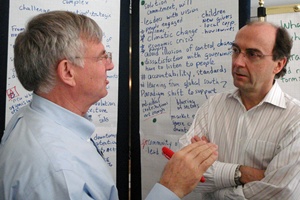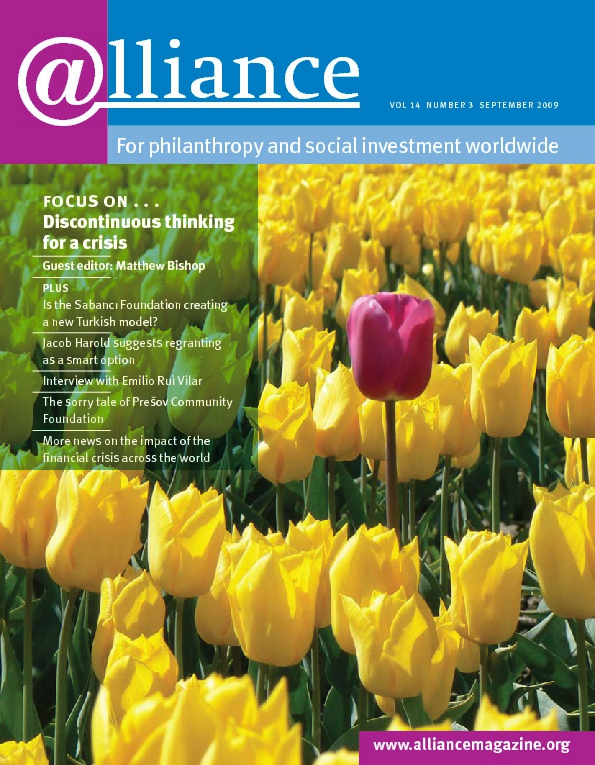Against a backdrop of worldwide philanthropic growth, the increasingly global nature of urgent challenges, and the pressure for more efficient use of donor resources in the current economic downturn, the Council on Foundations, European Foundation Centre and Worldwide Initiatives for Grantmaker Support (WINGS) jointly convened 44 philanthropic leaders from around the world to explore how to work together more effectively for global change.
The meeting, which took place on 16 and 17 May in Rome, was structured around three broad topics, each of which was introduced through a background paper and lead remarks from one of the participants. Rayna Gavrilova, Executive Director of the Trust for Civil Society in Central & Eastern Europe, commented on a vision for the future and philanthropy’s role in achieving it. Judith Rodin, President of the Rockefeller Foundation, addressed legal barriers to cross-border philanthropy and how they might be reduced on a global basis. And Bhekinkosi Moyo, Programme Director for TrustAfrica, offered some strategies for strengthening global philanthropy and achieving global change.
 Participants noted that the landscape of philanthropy is changing rapidly as old models are giving way to new approaches and partnerships better suited to addressing urgent global concerns like poverty, environmental destruction and infectious diseases. Yet, some wondered whether philanthropy, particularly at a time of global economic crisis, is really stepping up to the challenges and opportunities to develop innovative ideas and support change agents.
Participants noted that the landscape of philanthropy is changing rapidly as old models are giving way to new approaches and partnerships better suited to addressing urgent global concerns like poverty, environmental destruction and infectious diseases. Yet, some wondered whether philanthropy, particularly at a time of global economic crisis, is really stepping up to the challenges and opportunities to develop innovative ideas and support change agents.
Questioning whether foundations can afford to continue with ‘business as usual’, some participants urged a new commitment to effective philanthropic collaboration both within and across borders. At the same time, it was recognized that structural barriers to cross-border philanthropy are hindering this goal, noting the trend towards more philanthropic protectionism at the national level even as the world becomes more interdependent.
Some participants felt that foundations need to become better at deploying their non-financial assets like knowledge, networks, convening power and influence. Others worried that organized philanthropy is attempting to solve global problems by itself rather than seeking solutions by and through affected communities. A paradigm shift is needed, it was argued, away from traditional grantor-grantee relationships based on ‘problem-solutions’ thinking to a more collaborative spirit of building communities and working together for systemic change.
The group agreed that the host organizations should initiate follow-up work in three priority areas:
- creating a more favourable global environment for cross-border philanthropy;
- developing models or vehicles for pooling resources and increasing philanthropic collaboration;
- identifying key political opportunities and levers to engage with national and regional policymakers as well as multilateral organizations.
As a result, the Council on Foundations, EFC and WINGS are creating an ongoing global philanthropic leadership working group to coordinate task forces that will focus on each of the three areas.
For more information
For a report on the global philanthropic leadership meeting and the three background papers:
http://www.cof.org/international
http://www.efc.be/global
http://www.wingsweb.org
Caption Global leaders deep in discussion: Bradford Smith, President of the US-based Foundation Center (right) with meeting facilitator Tom Lent of the Academy for Educational Development.






Comments (0)